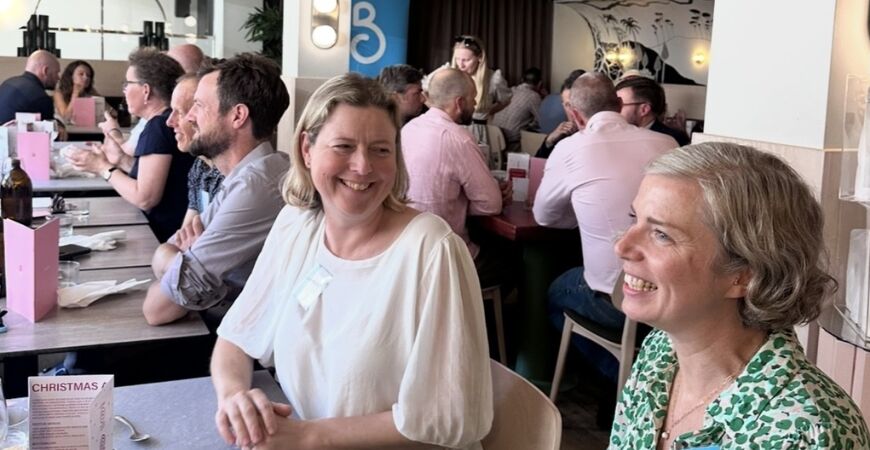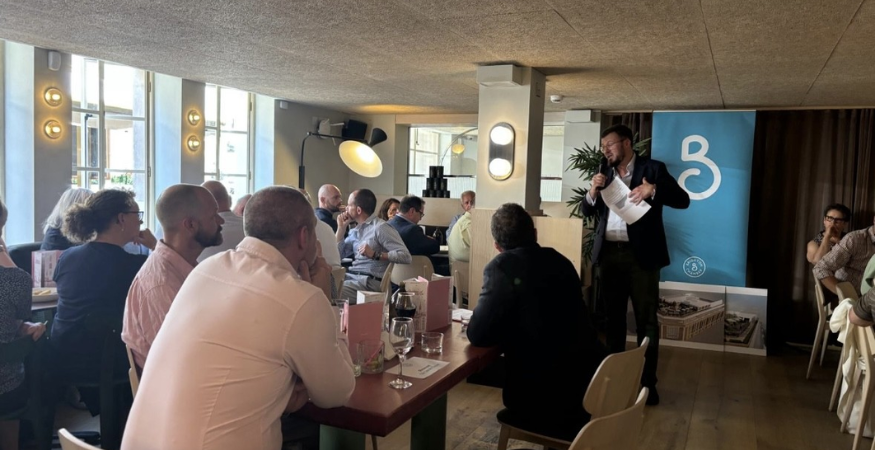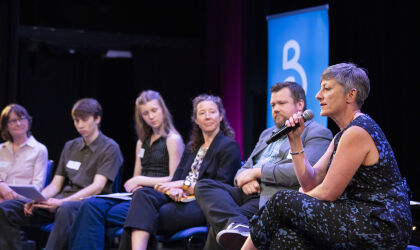

Fri 11 / 07 / 25
Construction Voice Lunch: A big conversation about Brighton & Hove's future
This summer’s Construction Voice Lunch felt like more than another industry catch-up. Hosted at Redroaster, it brought together developers, councillors, local business owners, and planning experts to tackle a topic that’s quickly gaining momentum: what devolution could mean for Brighton & Hove.
By Maria Dimitrova of Brighton Chamber
Now in its tenth year, Construction Voice continues to create space for open, timely conversations, thanks to the support of our brilliant partners: RLF, Haydon Consulting, Graves Jenkins, Hampson Architects, and Lewis & Co Planning and Base One
Before hearing from our guest speaker, Councillor Jacob Taylor, we heard from event sponsor We Build, a company doing things a little differently. Their Workspace & Facilities Manager, Debbie Thompson, shared a snapshot of their model: everything delivered in-house, a strong focus on reimagining underused sites like car parks and vacant buildings, and a commitment to reducing carbon across their projects – including their latest project, Sovereign House – a 75,000 square ft office space on Church Street, Brighton & Hove.
Devolution: A policy term with real-world impact

The heart of the discussion, though, was devolution. A word that might sound a little technical at first, but, as our guest speaker Councillor Jacob Taylor made clear, could bring very real changes to how Brighton is shaped, funded, and governed in the years ahead.
Devolution means shifting some decision-making powers and some funding from Westminster to our own backyard. It’s about giving places like Sussex more say over how things like housing, transport, skills, and climate policy are shaped and delivered.
Jacob, who’s Deputy Leader of Brighton & Hove City Council and has a background in investment banking before entering public service, shared facts and statistics, highlighting that the UK is one of the most centralised developed nations in the world, especially when compared to countries where economic spending is administered locally at levels of 65% to 70%.
We are in the low 20%. We also have a housing crisis in the country as a whole and in the city, OECD (Organisation for economic co-operation & development) statistic showed we have the second lowest dwellings per capital in all of Europe and we are the fourth lowest in terms of new builds in Europe.
What's next for Brighton & Hove?
If Sussex becomes a Mayoral Combined Authority, a new Sussex Mayor would have powers over housing, regeneration, transport and more. Importantly, this wouldn’t take control away from local councils as it would open new funding opportunities and let cities like Brighton pitch directly for what they really need.
But here’s the key point Jacob kept returning to: we need to be ready.
Other cities like Bradford and Coventry have already shown what’s possible when they prepare early. Bradford used devolved powers to create a new skills hub that now supports over 50,000 people a year. That kind of success only happens when business communities and councils work together from the outset.
So Jacob encouraged everyone in the room: start thinking now. Bring forward sites, ideas, and projects that could benefit from future funding. If we wait until the mayor is elected in 2026, we’ll be playing catch-up.
Some of the big opportunities
Jacob highlighted several sites across Brighton & Hove where investment and regeneration could make a real difference: Black Rock, King Alfred, Madeira Terrace, and New England House were all mentioned as having huge potential. He also pointed to large housing estates around the city that could benefit from sustainable renewal projects that, with the right funding and planning, could deliver real social and environmental value. This will open the chance to build better, more sustainable housing stock to replace ageing tower blocks.
But the challenges are real like the rising homelessness, ageing council buildings, sky-high rents. There are around 8,000 families on the Council’s housing waiting list, hundreds of families presenting as homeless each week or going into temporary accommodations. Despite the financial pressures faced by the council, we still have ageing council stock and a high number of council units in the city, along with a strong economy. We don’t have a strong industrial economy, but we have a very strong visitor economy, tech economy and financial services.
By the end of the lunch, one thing was clear: Brighton & Hove is at a turning point. Devolution won’t fix everything overnight, but it could open doors that have felt shut for a long time.
The big question now is how we as developers, planners, policymakers, and community members respond. Will we step forward with bold, thoughtful ideas? Will we collaborate across sectors to shape a future that’s inclusive, sustainable, and locally led?
If one thing was clear from the event, it’s this: Brighton & Hove has big problems but even bigger potential. And with the right people at the table, there’s a real opportunity to shape our city’s future from the ground up.
Devolution is a big topic for Brighton and Sussex, and the Chamber is working with partners and businesses locally to help you understand what it could mean for your business over the coming months. Sign up to our mailing list to stay up to date.
If you want to contribute to the Chamber blog, contact us on hannah@brightonchamber.co.uk



